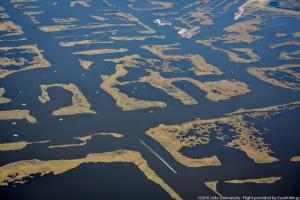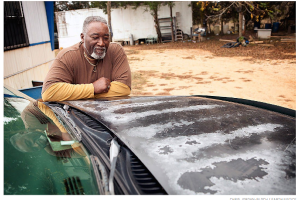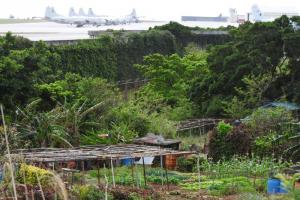America's Toxic Prisons: The Environmental Injustices of Mass Incarceration
Truthout
 The U.S. military is a key climate polluter, likely the “largest organizational user of petroleum in the world,” according to a congressional report released in December 2012. Beyond its immediate carbon footprint—which is difficult to measure—the U.S. military has placed countless countries under the thumb of western oil giants. Social movements have long sounded the alarm over the link between U.S.-led militarism and climate change.
The U.S. military is a key climate polluter, likely the “largest organizational user of petroleum in the world,” according to a congressional report released in December 2012. Beyond its immediate carbon footprint—which is difficult to measure—the U.S. military has placed countless countries under the thumb of western oil giants. Social movements have long sounded the alarm over the link between U.S.-led militarism and climate change.
 The Louisiana coast loses a football field’s worth of land every 38 minutes. This staggering rate of land loss has been brought on by climate change and coastal erosion accelerated by human activities, including water diversion projects and damage done by the oil and gas industry.
Moderator's Note: Go to original source for mind-boggling photos of criminal devastation.
The Louisiana coast loses a football field’s worth of land every 38 minutes. This staggering rate of land loss has been brought on by climate change and coastal erosion accelerated by human activities, including water diversion projects and damage done by the oil and gas industry.
Moderator's Note: Go to original source for mind-boggling photos of criminal devastation.
 Did you know that some of the fruits and veggies out on supermarket shelves are grown using wastewater from oil and gas operations? For the past several years, many drought-stricken farms in California’s Central Valley, which produces 40 percent of the nation’s fruits and vegetables, have been increasingly irrigating their crops with wastewater. Chemicals present include 16 the state classifies as carcinogens or reproductive toxicants, says EWG report.
Did you know that some of the fruits and veggies out on supermarket shelves are grown using wastewater from oil and gas operations? For the past several years, many drought-stricken farms in California’s Central Valley, which produces 40 percent of the nation’s fruits and vegetables, have been increasingly irrigating their crops with wastewater. Chemicals present include 16 the state classifies as carcinogens or reproductive toxicants, says EWG report.
 It is with deep concern that I write to address the ongoing travesty inflicted on the residents of one small, impoverished community: Uniontown, Perry County, in Alabama's Black Belt. My family has lived in Uniontown for many generations and, as a longtime resident, I have observed with sadness the harmful effects, distress, and heartache Uniontown citizens have experienced since the establishment of Arrowhead Landfill.
It is with deep concern that I write to address the ongoing travesty inflicted on the residents of one small, impoverished community: Uniontown, Perry County, in Alabama's Black Belt. My family has lived in Uniontown for many generations and, as a longtime resident, I have observed with sadness the harmful effects, distress, and heartache Uniontown citizens have experienced since the establishment of Arrowhead Landfill.
 On the morning of February 18, 2015, the ExxonMobil oil refinery in Torrance, California exploded, causing chemical ash to rain on the surrounding community for hours. Eight workers had to be decontaminated and four were sent to hospitals with minor injuries. With new evidence that the explosion could have been much worse, and that other aging refineries around the country are also at risk, scientists, industry watchdogs and a few lawmakers are sounding an alarm.
On the morning of February 18, 2015, the ExxonMobil oil refinery in Torrance, California exploded, causing chemical ash to rain on the surrounding community for hours. Eight workers had to be decontaminated and four were sent to hospitals with minor injuries. With new evidence that the explosion could have been much worse, and that other aging refineries around the country are also at risk, scientists, industry watchdogs and a few lawmakers are sounding an alarm.
 Located in the center of Okinawa Island, Kadena Air Base is the largest United States Air Force installation in Asia. Documents obtained under the U.S. Freedom of Information Act reveal how years of accidents and neglect have polluted local land and water with hazardous chemicals including arsenic, lead, polychlorinated biphenyls (PCBs), asbestos and dioxin.
Located in the center of Okinawa Island, Kadena Air Base is the largest United States Air Force installation in Asia. Documents obtained under the U.S. Freedom of Information Act reveal how years of accidents and neglect have polluted local land and water with hazardous chemicals including arsenic, lead, polychlorinated biphenyls (PCBs), asbestos and dioxin.
 In spite of the growing sense of disbelief and horror surrounding the lead contamination of drinking water in the Michigan city of Flint, at least one thing is clear: that the catastrophic levels of pollution and destruction are a direct result of the extreme policies pursued by the Michigan's right-wing leadership.
In spite of the growing sense of disbelief and horror surrounding the lead contamination of drinking water in the Michigan city of Flint, at least one thing is clear: that the catastrophic levels of pollution and destruction are a direct result of the extreme policies pursued by the Michigan's right-wing leadership.
 From Haiti to Michigan and across the world, millions - especially poor and marginalized populations - are being denied the human right to clean water and sanitation. These water crises, though distinct in important ways, can both be traced back to longstanding human-made systems that have simultaneously neglected and exploited low-income communities of color.
From Haiti to Michigan and across the world, millions - especially poor and marginalized populations - are being denied the human right to clean water and sanitation. These water crises, though distinct in important ways, can both be traced back to longstanding human-made systems that have simultaneously neglected and exploited low-income communities of color.
Spread the word